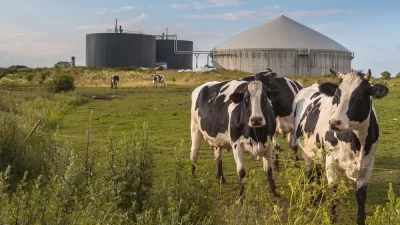Oregon may end its low carbon fuel standard, one of two in the nation, to increase the gas tax by four cents and implement a bevy of clean fuel alternatives to replace the three-month-old clean fuels program.
"Gov. Kate Brown's office and eight legislators agreed to repeal Oregon's clean fuels program as part of a deal to raise $200 million a year for transportation projects, according to details leaked [June 18] to The Oregonian/OregonLive," writes Oregonian government reporter Ian K. Kullgren in a series of articles on the controversial program and the related transportation dealmaking.
The agreement confirms, however, that Brown and some Democrats agreed to withdraw a law she signed only three months ago — March 12 — and that Democrats ultimately gave way to resolve a partisan standoff over the program.
The new governor, sworn into office on Feb. 18 to replace Gov. John Kitzhaber, has quickly shown that she is willing to retract laws she likes if the deal is right, and the agreement worked-out by the "gang of eight" was agreeable to her, particularly because it resolved "a partisan standoff over the [Clean Fuels] program."
On March 12, Brown signed Senate Bill 324, the Low-Carbon Fuel Standard, also known as Oregon Clean Fuels Program, that required oil suppliers "to progressively lower the amount of carbon their oil and gas products could emit," wrote Kullgren in an earlier piece describing the program. Upon signing the bill, she stated:
"I strongly support SB 324's goal to reduce greenhouse gas emissions. It is difficult to deny that we are seeing the effects of a warming planet. This year, 85 percent of our state is experiencing drought, with 33 percent experiencing extreme drought."
However, lowering the carbon content "is estimated to increase gas prices by 4 to 19 cents a gallon," writes Kullgren, causing Republicans to hold firm against a needed gas tax increase to finance infrastructure improvements.
Environmentalists blasted the bipartisan deal, arguing that "the new carbon plan lets oil distributors off the hook, leaving taxpayers to pick up the tab," writes Kullgren. However, he adds that "according to Oregon Department of Environmental Quality estimates — the plan would reduce the state's carbon emissions by 8.5 million metric tons over 10 years, slightly higher than the 10 percent reduction outlined in the clean fuels program."
The agreement reached by the four Republicans and four Democrats includes seven bullet points, including:
- It would repeal the clean fuels standard and replace it with a new biofuel-blending program. Under the new plan, fuel distributors would be required to buy any available fuel that the state Department of Agriculture determined would have a lower carbon impact, be safe for engines, and not cost more.
- It would increase gasoline taxes, over two years, by four cents to 34 cents a gallon. That would produce an estimated $200 million a year for transportation projects. The group had not decided how the money would be spent but referred to a list of projects from the Oregon Department of Transportation.
"Lawmakers, with the session set to end by July 11, are racing the clock," writes Kullgren on June 23. "And because the legislation contains tax increases, it must get approval from a three-fifths 'supermajority' in both chambers."
FULL STORY: Transportation deal revealed: Lawmakers agreed to ax clean fuels for road fixes, documents show

Alabama: Trump Terminates Settlements for Black Communities Harmed By Raw Sewage
Trump deemed the landmark civil rights agreement “illegal DEI and environmental justice policy.”

Study: Maui’s Plan to Convert Vacation Rentals to Long-Term Housing Could Cause Nearly $1 Billion Economic Loss
The plan would reduce visitor accommodation by 25% resulting in 1,900 jobs lost.

Planetizen Federal Action Tracker
A weekly monitor of how Trump’s orders and actions are impacting planners and planning in America.

Wind Energy on the Rise Despite Federal Policy Reversal
The Trump administration is revoking federal support for renewable energy, but demand for new projects continues unabated.

Passengers Flock to Caltrain After Electrification
The new electric trains are running faster and more reliably, leading to strong ridership growth on the Bay Area rail system.

Texas Churches Rally Behind ‘Yes in God’s Back Yard’ Legislation
Religious leaders want the state to reduce zoning regulations to streamline leasing church-owned land to housing developers.
Urban Design for Planners 1: Software Tools
This six-course series explores essential urban design concepts using open source software and equips planners with the tools they need to participate fully in the urban design process.
Planning for Universal Design
Learn the tools for implementing Universal Design in planning regulations.
Caltrans
Smith Gee Studio
Institute for Housing and Urban Development Studies (IHS)
City of Grandview
Harvard GSD Executive Education
Toledo-Lucas County Plan Commissions
Salt Lake City
NYU Wagner Graduate School of Public Service




























